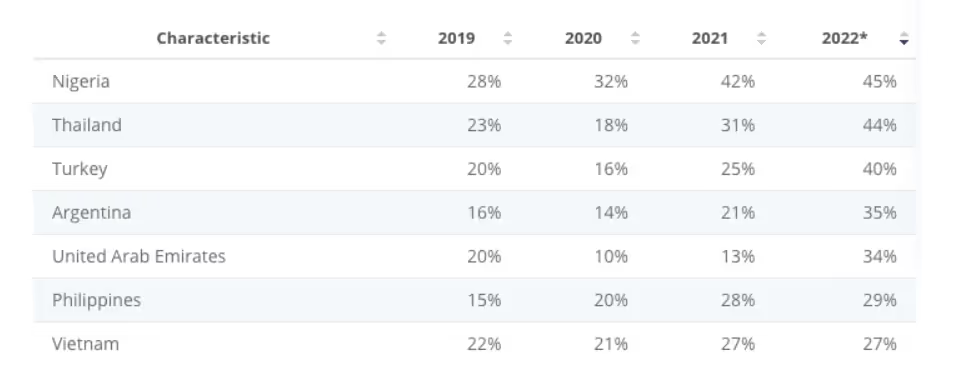.avif)
Calculate Your Crypto
Taxes in Minutes

According to a report by Crypto.com, global cryptocurrency owners increased by 39% in 2022 – rising from 306 million in January to 425 million in December.
And with the adoption consistently soaring with every passing year, it uncovers some serious regulatory challenges. Regulators from across the globe have joined hands and are trying to make coordinated efforts to regulate this space. Kryptos is here to uncover what these regulations actually mean in terms of crypto investments and taxes and how they will affect you.
What is The Need For Global Crypto Regulations?
Crypto has evolved significantly since 2011 when it was primarily associated with Bitcoin. It now includes all digital assets and has revolutionised sectors such as Finance and Art. Small businesses embrace crypto for its modern utility, while big businesses hold it as a hedge against inflation on their balance sheets.

Source: Statista
However, it’s not all good news. The crypto space represents a significant economic value and since there are interlinkages with the traditional financial ecosystem and capital markets, its collapse may have severe repercussions on our existing financial frameworks.
The fall of Terra Labs and FTX had a major impact on retail and institutional investors. Crypto fraud and theft are more prevalent, and money laundering with crypto tumblers is a negative use case the industry was initially accused of.
Crypto assets pose real threats such as operational and financial integrity risks, lack of investor protection, insincere reporting, and over-dependence of small nations on crypto in the absence of proper payment infrastructure. These threats highlight the need for a comprehensive regulatory framework.
Crypto and The Global Regulatory Landscape
Governments globally tighten crypto regulations to protect against financial losses. Canada adopts a relaxed approach, offering a 50% capital gains tax discount. Conversely, India takes a conservative stance, imposing a 30% tax rate on all crypto transactions, excluding additional charges. Diverse strategies address crypto asset taxation.
Europe's AMLD-5, AMLD-6, and FinCEN's final rule in the USA enforce strict KYC regulations on exchanges. The proposed DAC-8 framework in the European Union, launching in January 2026, will require exchanges to collect, validate, and report user-related information for crypto assets. This aligns with the upcoming implementation of the CARF in 2024, marking significant progress.
MiCA (Markets in Crypto-Assets) is another regulatory framework proposed by the European Union to bring governance practices to crypto firms and avoid financial instabilities like rout and contagion.
Therefore, if you’re planning to hide some crypto transactions from your local tax authorities with the intention of saving a couple of bucks in taxes, don’t. It might attract legal trouble because most tax authorities can track your crypto transactions and correlate them with your KYC details to identify discrepancies.
Regardless of what part of the world you reside in, you should honestly report all your crypto transactions and file your crypto taxes on time. If you have any doubts regarding how to file your crypto taxes, or how it is taxed in the first place, you can visit our guides.
Kryptos’s Role in Global Regulatory Efforts
Regulators in most countries compel residents to maintain proper records of their crypto transactions from the past 3-7 years depending on the country. In fact, the Australian Taxation Office (ATO) recommends using a “trusted crypto tax calculator” for proper record keeping of crypto transactions.
Kryptos has collaborated with the INATBA – International Association for Trusted Blockchain Applications, a trusted and influential association in the heart of Europe that facilitates dialogue between public and private entities for the global convergence of regulatory approaches and the global adoption of blockchain and related technologies.
It is one of the most trusted crypto tax calculators that offers over 2000+ wallet, exchange, and DeFi integrations and lets you fetch your transactions to the central dashboard. Moreover, with features like live tracking, new transactions are immediately added to the ledger.
You can also use Kryptos to generate country-specific, legally compliant tax reports within minutes.
Conclusion:
Although the importance of these regulatory changes can’t be denied, their existence makes crypto taxes more intimidating. That’s where Kryptos comes into the picture with a comprehensive set of tools and resources to educate and empower individuals and help them file their crypto taxes conveniently.
All content on Kryptos serves general informational purposes only. It's not intended to replace any professional advice from licensed accountants, attorneys, or certified financial and tax professionals. The information is completed to the best of our knowledge and we at Kryptos do not claim either correctness or accuracy of the same. Before taking any tax position / stance, you should always consider seeking independent legal, financial, taxation or other advice from the professionals. Kryptos is not liable for any loss caused from the use of, or by placing reliance on, the information on this website. Kryptos disclaims any responsibility for the accuracy or adequacy of any positions taken by you in your tax returns. Thank you for being part of our community, and we're excited to continue guiding you on your crypto journey!
| Step | Form | Purpose | Action |
|---|---|---|---|
| 1 | 1099-DA | Reports digital asset sales or exchanges | Use to fill out Form 8949. |
| 2 | Form 1099-MISC | Reports miscellaneous crypto income | Use to fill out Schedule 1 or C. |
| 3 | Form 8949 | Details individual transactions | List each transaction here. |
| 4 | Schedule D | Summarizes capital gains/losses | Transfer totals from Form 8949. |
| 5 | Schedule 1 | Reports miscellaneous income | Include miscellaneous income (if not self-employment). |
| 6 | Schedule C | Reports self-employment income | Include self-employment income and expenses. |
| 7 | Form W-2 | Reports wages (if paid in Bitcoin) | Include wages in total income. |
| 8 | Form 1040 | Primary tax return | Summarize all income, deductions, and tax owed. |
| Date | Event/Requirement |
|---|---|
| January 1, 2025 | Brokers begin tracking and reporting digital asset transactions. |
| February 2026 | Brokers issue Form 1099-DA for the 2025 tax year to taxpayers. |
| April 15, 2026 | Deadline for taxpayers to file their 2025 tax returns with IRS data. |
| Timeline Event | Description |
|---|---|
| Before January 1, 2025 | Taxpayers must identify wallets and accounts containing digital assets and document unused basis. |
| January 1, 2025 | Snapshot date for confirming remaining digital assets in wallets and accounts. |
| March 2025 | Brokers begin issuing Form 1099-DA, reflecting a wallet-specific basis. |
| Before Filing 2025 Tax Returns | Taxpayers must finalize their Safe Harbor Allocation to ensure compliance and avoid penalties. |
| Feature | Use Case Scenario | Technical Details |
|---|---|---|
| Automated Monitoring of Transactions | Alice uses staking on Ethereum 2.0 and yield farming on Uniswap. Kryptos automates tracking of her staking rewards and LP tokens across platforms. | Integrates with Ethereum and Uniswap APIs for real-time tracking and monitoring of transactions. |
| Comprehensive Data Collection | Bob switches between liquidity pools and staking protocols. Kryptos aggregates all transactions, including historical data. | Pulls and consolidates data from multiple sources and supports historical data imports. |
| Advanced Tax Categorization | Carol earns from staking Polkadot and yield farming on Aave. Kryptos categorizes her rewards as ordinary income and investment income. | Uses jurisdiction-specific rules to categorize rewards and guarantee compliance with local tax regulations. |
| Dynamic FMV Calculation | Dave redeems LP tokens for Ethereum and stablecoins. Kryptos calculates the fair market value (FMV) at redemption and during sales. | Updates FMV based on market data and accurately calculates capital gains for transactions. |
| Handling Complex DeFi Transactions | Eve engages in multi-step DeFi transactions. Kryptos tracks value changes and tax implications throughout these processes. | Manages multi-step transactions, including swaps and staking, for comprehensive tax reporting. |
| Real-Time Alerts and Updates | Frank receives alerts on contemporary tax regulations affecting DeFi. Kryptos keeps him updated on relevant changes in tax laws. | Observe regulatory updates and provide real-time alerts about changes in tax regulations. |
| Seamless Tax Reporting Integration | Grace files taxes using TurboTax. Kryptos integrates with TurboTax to import staking and yield farming data easily. | Direct integration with tax software like TurboTax for smooth data import and multi-jurisdictional reporting. |
| Investor Type | Impact of Crypto Tax Updates 2025 |
|---|---|
| Retail Investors | Standardized crypto reporting regulations make tax filing easier, but increased IRS visibility raises the risk of audits. |
| Traders & HFT Users | To ensure crypto tax compliance, the IRS is increasing its scrutiny and requiring precise cost-basis calculations across several exchanges. |
| Defi & Staking Participants | The regulations for reporting crypto transactions for staking rewards, lending, and governance tokens are unclear, and there is a lack of standardization for decentralized platforms. |
| NFT Creators & Buyers | Confusion over crypto capital gains tax in 2025, including the taxation of NFT flips, royalties, and transactions across several blockchains. |
| Crypto Payments & Businesses | Merchants who take Bitcoin, USDC, and other digital assets must track crypto capital gains for each transaction, which increases crypto tax compliance requirements. |
| Event | Consequences | Penalties |
|---|---|---|
| Reporting Failure | The tax authorities can mark uncontrolled revenues and further investigate. | Penalty fines, interest on unpaid taxes and potential fraud fees if they are deliberately occurring. |
| Misreporting CGT | Misreporting CGT Error reporting profits or losses can trigger the IRS audit. | 20% fine on under -ported zodiac signs, as well as tax and interest. |
| Using decentralized exchanges (DEXs) or mixers without records | The IRS can track anonymous transactions and demand documentation. | Possible tax evasion fee and significant fine. |
| Disregarding Bitcoin mining tax liabilities | Mining reward is considered taxable income, and failure of the report can be regarded as tax fraud. | Further tax obligations, punishment and potential legal steps. |
| Foreign crypto holdings: Non-disclosure | Foreign-accepted crypto FATCA may be subject to reporting rules. | Heavy fines (up to $ 10,000 per fracture) or prosecution for intentional non-transport. |
File Your Crypto Tax in Minutes








